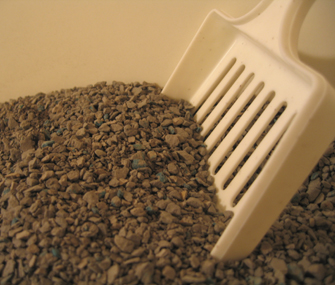10 Ways to Ace Litterbox Maintenance and Keep Your Kitty Happy
Published on November 03, 2012

It probably won’t shock you to learn that the most common behavior problem reported among cats is house soiling.
It should also come as no surprise that a reluctance to stay within the box’s boundaries is one of the top reasons why some cats end up in shelters — one study found that 23 percent of relinquished cats soiled their homes one or more times a week.
There are three reasons why cats tend to exhibit what we euphemistically refer to as feline elimination disorders:
Medical Causes: A variety of medical conditions — kidney disease, diabetes, bladder stones and bladder infections — can cause cats to urinate outside their litterbox. Owners who witness “accidents” should not assume that the problem is behavioral. If your cat stops peeing regularly in the litterbox, schedule a visit with your veterinarian.
Stress: Cats will often announce that they’re feeling stressed or territorial (say if a new cat enters the picture) by house soiling. Sometimes they’ll do it willy-nilly, and other times, they’ll soil in very specific patterns, which may indicate the source of the problem.
Litterbox Unhappiness: In case you’ve never experienced it, hell hath no fury like a feline pissed off over the state of her litterbox. Many things can suddenly make a box less alluring, including a new litter, a new cleaner and a new location.
So if you happen to have a kitty who’s been missing her box — and medical causes have been ruled out — here are 10 simple tips to consider when it comes to keeping your cat litterbox content:
Cleanliness Counts
If you’re always just barely keeping up with your scooping, the chances that your cat will stray from her box increase exponentially should any other stress surface. And if your kitty has a potential litterbox issue, daily cleaning (not just scooping) is usually indicated — at least until matters are back under control.
Location Matters
Cats are territorial. Even felines who appear to get along can harbor uncomfortable feelings toward one another. That’s why placing litterboxes strategically helps — your home may begin to look like litterbox central, but it certainly beats having one that smells like it. You should also consider that boxes placed near windows or doors may be problematic due to their proximity to outdoor cats.
More Is Better
Some feline specialists advise having one extra litterbox per the number of cats in your household — so one kitty should ideally have two litterboxes, and two felines should have three etc. Sure, some owners can get away with less, but once you have three cats, you are risking your felines’ comfort — along with your household’s aromatic integrity.
Consider Your Litter
Even if it’s just temporary, think about offering a variety of litterboxes with a variety of litters until you find the right fit for your kitty. I once had a patient who refused to use the litterbox unless it had plain newspaper lining.
Bigger Really Is Better
Not only do cats feel more clean and comfy in a sizable sand box, they also feel less threatened by potential assailants should a territorial dispute arise.
Don’t Put a Lid On It
Enclosed litterbox quarters can be especially discomfiting for cats who live in chronic competition with other felines. How would you feel if ambush was a possibility each time that you left the bathroom? This is why large boxes, sans lids, can be so wonderful. Consider buying one of those clear boxes with a kitty-sized opening above the litter level — so if she spies an assailant on the horizon, she can escape over the top.
Old Reliable
Once you find a product that your cat likes, stick to it. That litter on sale may look tempting, but when you consider that your kitty has to readjust every time that you find a bargain, it may not be such a great deal in the long run. This can be especially problematic if you make a drastic change after years of brand loyalty.
The Clumping Question
Here’s an area that’s been well-studied by litter manufacturers, who’ve demonstrated that not only do people prefer clumping litters but so do their cats.
Ahhh, the Aroma
Although fragrances, in particular, have not been associated with elimination disorders, it seems that cats tend to prefer cedar, bleach and fish odors to floral and citrus scents. Moreover, odor-controlling litters can stretch the life of a slightly dirty box, which is helpful when your cat is finicky about cleanliness.
Know Thine Cat
The key, as always, is to be aware of your feline’s individual litterbox peccadilloes. It really can make the difference between a healthy, happy cat and an unhealthy, overstressed kitty.
Check out more opinion pieces on Vetstreet.





